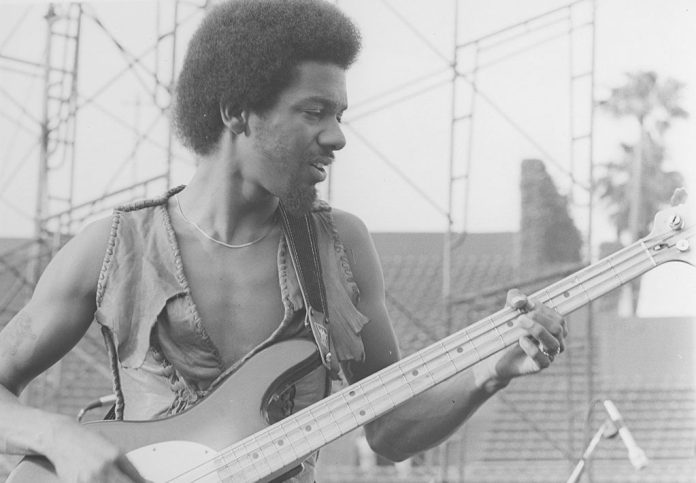Everybody loves how it feels when the bass drops…but err’body ain’t able to make it happen. Here are ten of the greatest arbiters of low-end theory for your perusal.
Stanley Clarke
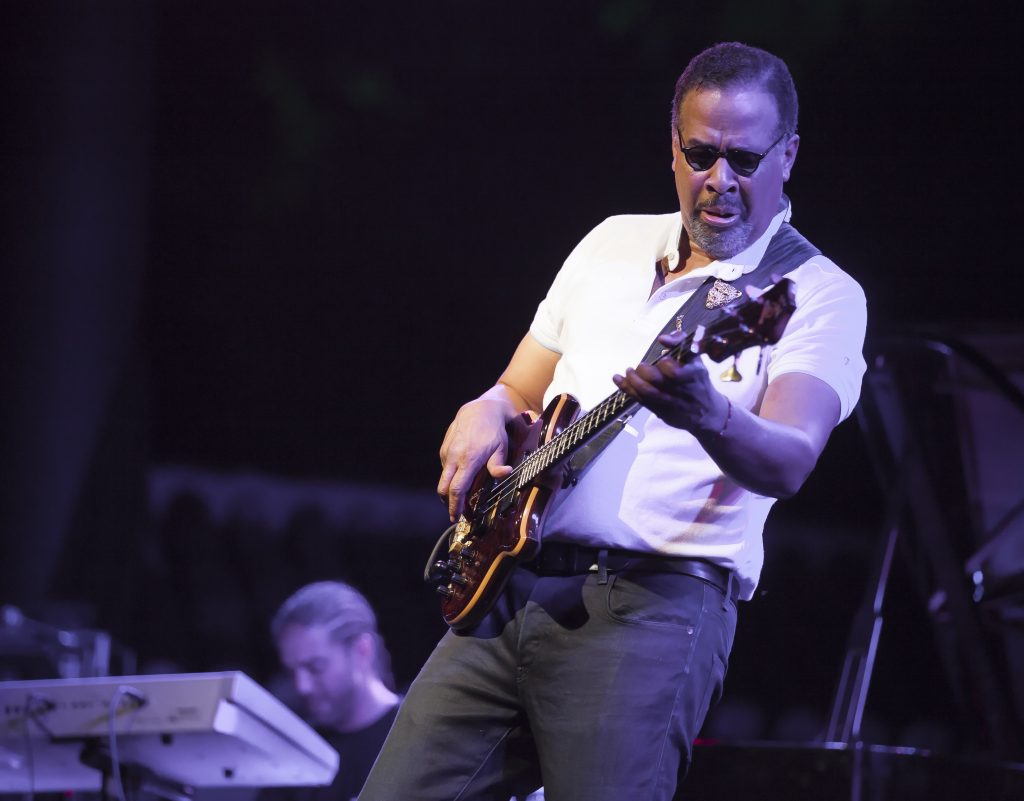
All hail the king from the streets of Philadelphia! Clarke is most responsible for bringing electric bass out of the background as a lead instrument, kicking out melodies and jaw-dropping solos – from the frenetic to the eloquent.
His composition “School Days” is an all-time band jam classic. Clarke is also a master of upright/arco acoustic bass in Jazz and Classical contexts, is a prolific composer of songs, suites and film scores, and has produced Jazz and Pop artists from Dee Dee Bridgewater to McCoy Tyner.
He was a member of Rolling Stones guitarist Ron Wood’s all-star Rock band The New Barbarians, has been the leader of several bands in the tradition of greats from the past that usher great young talent into the big time, is a founding member of the pioneering Jazz-Rock Fusion band Return to Forever (w/ the late Chick Corea) AND one half of the unlimited duo The Clarke-Duke Project (w/ the late George Duke).
He also sings and, early in his career, was a much sought-after session musician/sideman, recording with Joe Henderson, Stan Getz, Deodato, Dexter Gordon, Donny Hathaway, Aretha Franklin, Gato Barbieri and Norman Connors, among many others.
James Jamerson
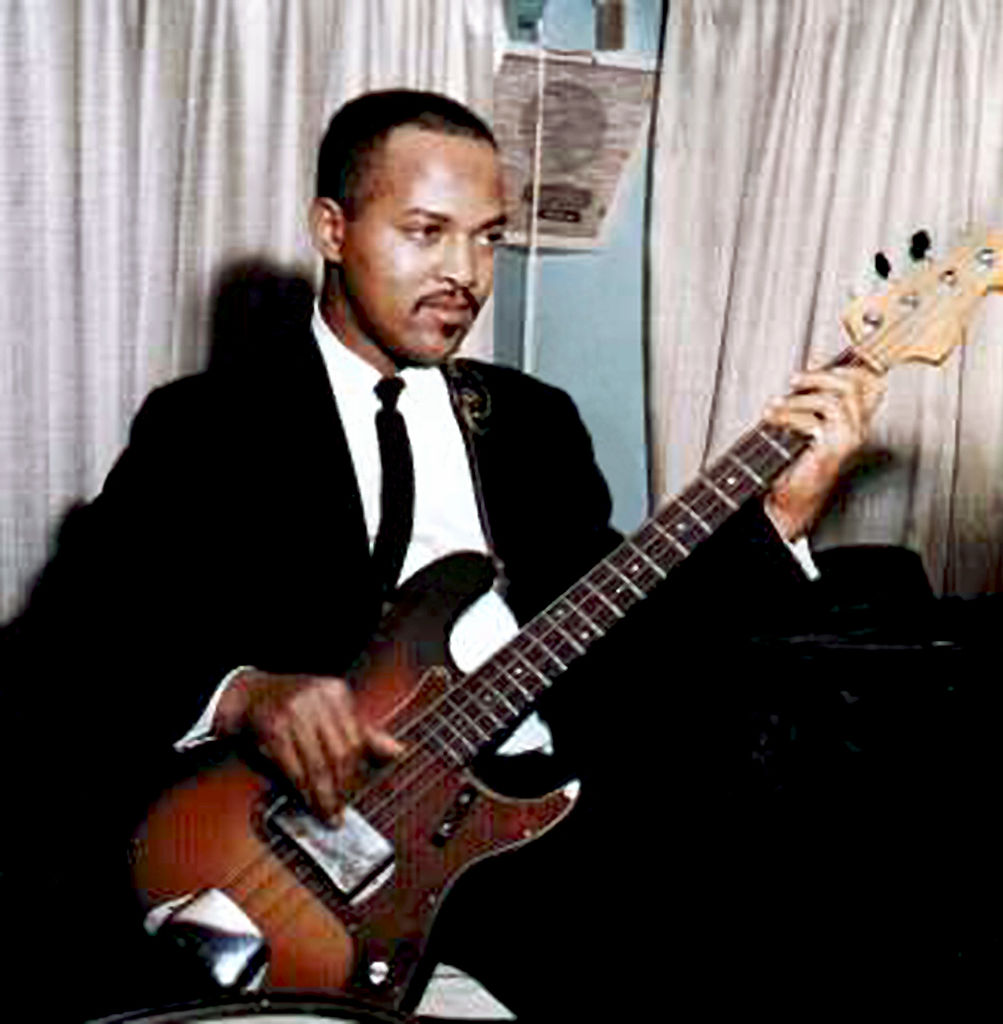
Often spoken of as the greatest electric bassist of all time, South Carolina-born Jamerson grabbed the Fender electric bass in its infancy – after playing acoustic jazz bass for a number of years inspired by Ray Brown, Paul Chambers and Percy Heath.
He proceeded to define its vocabulary on some of the most ebullient music of the `60s: the avalanche of hits coming out of Detroit’s Motown Records.
Close your eyes and just think about “You Can’t Hurry Love” by The Supremes, “Reach Out – I’ll Be There” by the Four Tops, “Shotgun” by Jr. Walker & The All-Stars, “Try it Baby” by The Temptations or “I Was Made to Love Her” by Stevie Wonder – merely five of hundreds that Jamerson’s bass carried like the wind beneath their wings.
He did the same on sessions away from Hitsville, such as “Higher and Higher” by Jackie Wilson and the boogie classic “Boom Boom” by blues legend John Lee Hooker.
The story most often told about Jamerson is that Marvin Gaye sent people looking for him in all the local bars so he could play on this special new tune he was perfecting. (Again, close our eyes and just think about “Ain’t That Peculiar.”)
When they finally brought Jamerson in to play, he was too intoxicated to stand up, so he recorded his now-legendary bass parts lying flat on his back. The song was “What’s Going On,” considered by many to be the greatest song of all time. Tragically, Jamerson died at just 47 years old from cirrhosis of the liver, heart failure, and pneumonia in Los Angeles.
Larry Graham
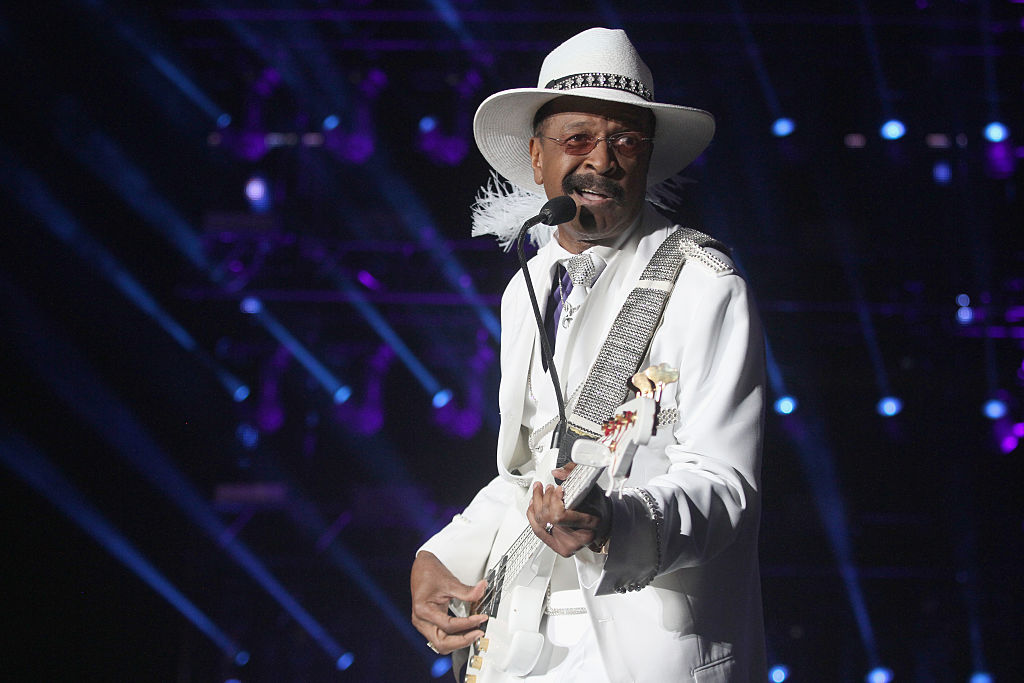
Brother Graham is the minister of sanctified funk as The One who introduced the percussive bass technique of “thumpin’ and pluckin’” to pop music – first as a member of groundbreaking Sly & The Family Stone then as leader of his own Graham Central Station.
On the way out of The Family Stone, Larry Graham hit the world with it on “Thank You Falletinme Be Mice Elf Agin” then went balls out nuts with it on GCS jams such as “Hair,” “Release Yourself,” “The Jam,” “It’s Alright,” “Water” and “Now Do-U-Wanta Dance.”
His style of playing gave listeners and dancers double the rhythm to deal with and made hearts thump with Holy Ghost bliss.
By “Earthquake,” he was knee-deep into Jimi Hendrixian fuzz effects and overdrive.
Suddenly, he shifted to primarily crooning ballads (spurred on by the success of the Sam Dees composition “A One in a Million You”) and odes of praise to Jehovah.
To this day, Graham can still throw down on the bass (he did so for years in Prince’s camp) but his custom axe has a special microphone attached so he can further indulge his first love of singing – from deep baritone rumblings, yes, but also to soaring falsetto flights (that was him singing those high parts on GCS’ R&B chart-topping “Your Love”). Respect.
Louis Johnson
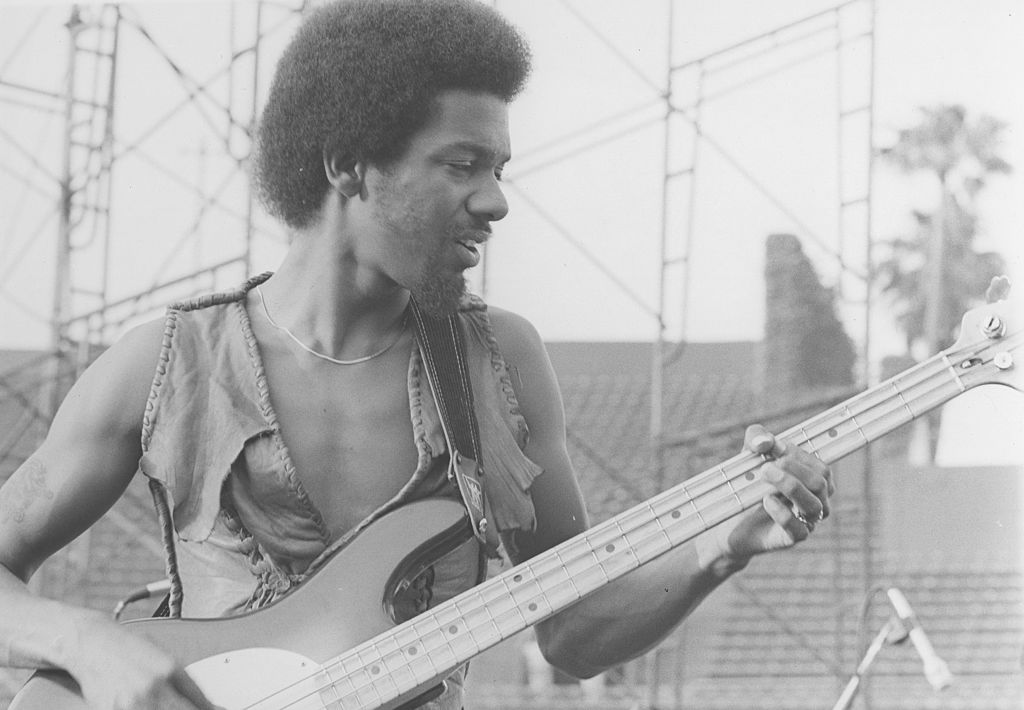
Of the scores of disciples to follow Larry Graham’s lead, Louis Johnson of Los Angeles grabbed the baton…and throttled the ^$&% out of it! Master of the slapping technique of bass playing, his thumb became as valuable to Funk as Wes Montgomery’s was to Jazz.
The world at large got to know Louis and his older brother George first as members of Billy Preston’s God Squad band followed swiftly after as featured guests on four songs from Quincy Jones’ Mellow Madness LP, including the hit “Is it Love that We’re Missing’ (the tame side of Louis’ playing) and “Trying to Find Out About You” (the wild side).
By the time of the duo’s debut LP as The Brothers Johnson, everybody was losing their mind over the club jam “Get the Funk Out Ma Face,” the radio hit “I’ll Be Good to You” (listen at that bottom) and the instrumental “Thunder Thumbs & Lightning Licks” (the brothers’ nicknames).
Louis’ heavy groove and showmanship in concert lifted hits for the duo such as “Ain’t We Funkin’ Now,” “Blam,” “Strawberry Letter 23,” “Welcome to the Club,” Stomp” and the Quiet Storm instrumental “Tokyo.”
Louis also shined as a session musician, first on Funk Jazz Fusion albums by Grover Washington, Jr. (It Feels So Good), Herbie Hancock (Man-child), Harvey Mason (Funk in a Mason Jar), Earl Klugh (“Twinkle”), Gabor Szabo (Macho) and Hugh Masekela & Herb Alpert.
He even guested on an infectious team-up with Stanley Clarke on the single “We Supply” while contributing mightily to Quincy Jones productions for Michael Jackson and Rufus & Chaka. Most significantly, Louis started a pioneering Black Contemporary Christian group with his wife Valerie Johnson and Richard Heath that they named Passage. Sadly, Louis was just 60 when he passed in 2015.
Marcus Miller
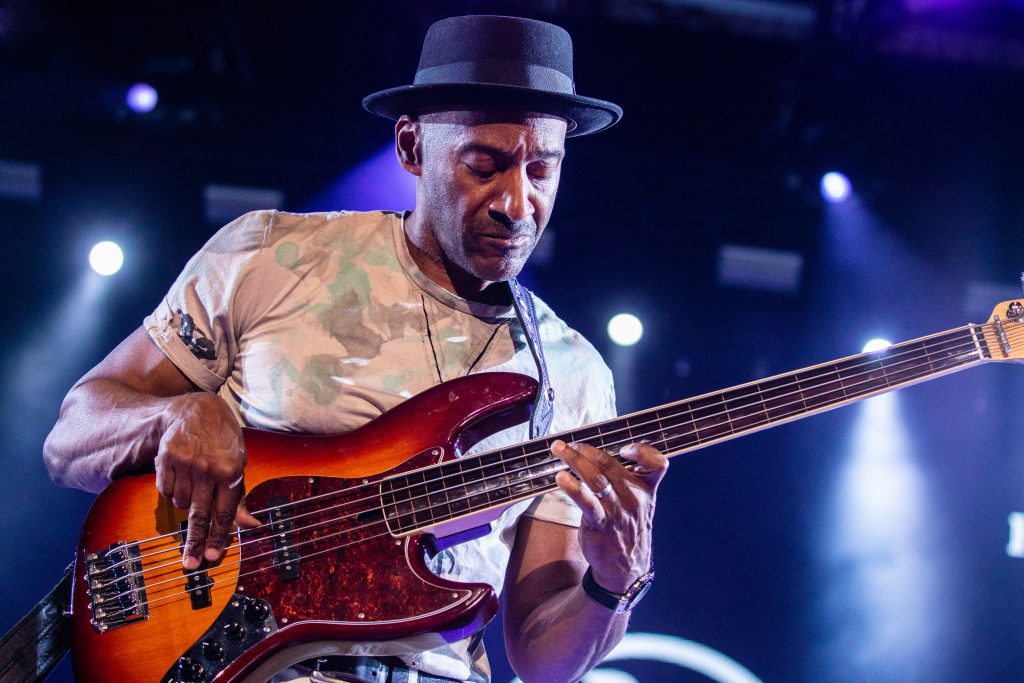
The ubiquitous and virtuous Mr. Miller of Jamaica, Queens, NYC was a prodigy of his father William who started both writing and composing young.
When he placed his first composition, “Sunset Burgundy” for flautist Bobbi Humphrey, Marcus was only 19. As he swiftly rose through the ranks of New York’s session elite, he always had a song in his bass case or in his mind that fit the bill.
His early session work included playing for Lonnie Liston Smith, Lenny White, Tom Browne, Roberta Flack, Grover Washington, Jr., Tom Scott, Kazumi Watanabe.
Lee Ritenour and so many more. However, he left his deepest imprints on the music of three giants: David Sanborn, Luther Vandross and Miles Davis.
For Miles, Marcus inadvertently composed the last great Jazz standard to date: “Tutu,” both covered and lyricized extensively. Literally and figuratively, Marcus Miller wears many hats as a producer, writer, bandleader, film scorer (he also wrote the instant Go-Go classic “Da Butt” for Spike Lee’s “School Daze”), Jazz festival impresario and more.
However, it is always the bass that most colorfully defines him as he glides and grooves over perceived genre boundaries – with or without frets…and even on bass clarinet!
Chuck Rainey
A true hero and groundbreaker as a session player and soul man, THE Chuck Rainey has a fluid bottom and a signature slide to his playing that sent him from essential for Aretha to in-demand by Steely Dan – often in partnership with drummer Bernard “Pretty” Purdie.
He is another master who started in Jazz yet made himself invaluable across the board, having recorded on over 1,000 albums, making him among the most recorded electric bassists in history. At 81, Cleveland-native Rainey is now officially retired and working on his biography.
Robbie Shakespeare
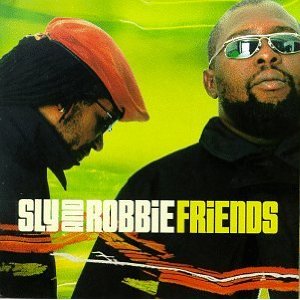
The Kingston, Jamaica-born Grand Puba of Reggae bass and dub is among the most influential bassists the world over for his ominous and rock steady playing.
As one half of the duo Sly & Robbie (with drummer Sly Dunbar) he has played behind AND produced a number of artists, perhaps most famously Grace Jones.
The duo were also members of royal Reggae band Black Uhuru. Shakespeare holds the distinction of playing not only with Jamaican stars such as Peter Tosh, Gregory Isaacs, Augustus Pablo and Yellowman, he has also recorded with Rock stars Joe Cocker, Mick Jagger, Cyndi Lauper and on Bob Dylan’s outstanding album, Infidels (Columbia – 1983). His shoutout in the dance classic “Genius of Love” by Tom Tom Club is richly deserved.
William “Bootsy” Collins
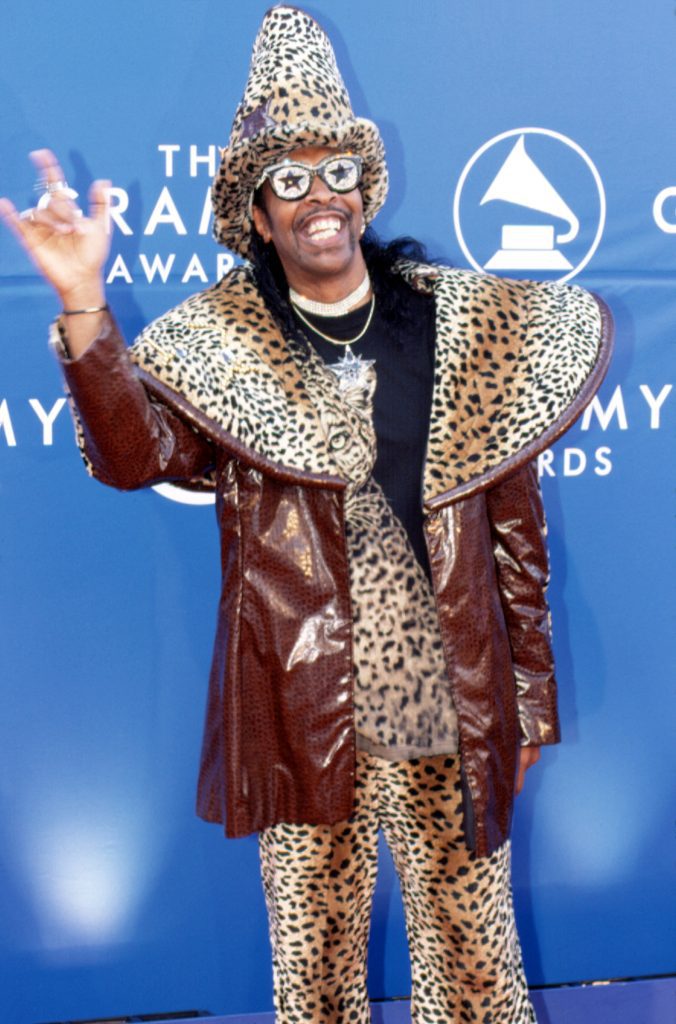
To have gone from learning ‘The One’ as a member of James Brown’s JB’s in the early `70s to co-creating the inebriating Funk-Rock pulse for Parliament-Funkadelic (with George Clinton, Bernie Worell and several sundry spin-offs from his own Rubber Band to The Brides of Funkenstein and Zapp) into the early `80s, Bootsy (as he was nicknamed by his mother) stands at master status.
Beyond those distinctions, like Stankey Clarke, Bootsy was major for bringing electric bass front and center as a cartoon character come to life – “a Rhine-stoned, rock star doll, baby bobba” whose colorful outfits and pioneering space bass playing was so powerful, it eclipsed William Collins, the man, to the point where he had to step away from the role for a while.
Upon his `90s return, he could be found everywhere from Keith Richards’ first solo album to club band Dee-Lite’s “Groove is in the Heart” and West Coast Hip-Hop joints.
Today he is an ambassador of good will and funky things to play with. We thank ‘Bootzilla’ profusely for providing us all with “Another Point of View.”
Esperanza Spalding

Never before has there been a female artist who started as a bassist then dramatically expanded the way that Esperanza Spalding has done.
She became so proficient on acoustic AND electric bass that while attending Berkley School of Music in Boston, she began teaching there as well.
Initially seen as a Jazz artist, the Portland, Oregon native of Welsh, Hispanic, Native American and African American descent swiftly blurred the lines with Latin, Hip-Hop, Neo Soul Pop recordings on which she played, sang, composed, arranged and rapped.
Her American debut CD, Esperanza. was so undeniably stunning, that she upset the 2008 Grammys, nabbing Best New Artist over teen heartthrob Justin Bieber, turning a gaggle of young girls into early Prozac dependency (just kidding).
She’s become a coveted collaborator in Jazz and beyond, and was one-third of the outstanding female trio ACS (the late Geri Allen on piano, drummer Terri Lyne Carrington and Spalding).
Nathan East
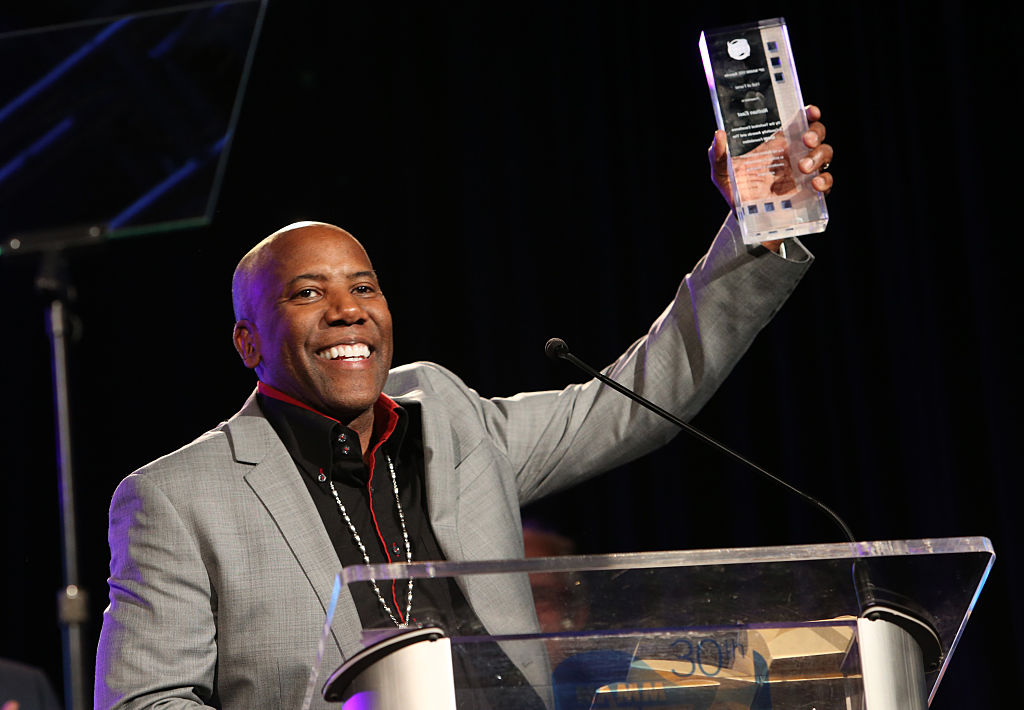
Born in Philly and raised in San Diego, Nathan East is another of
the most prolific and versatile electric bassists in all of music.
His resume is bursting with Soul, Rock, Jazz, Pop and country artists he has served including Teena Marie, Lee Ritenour, Hubert Laws, Kenny Rogers, Elton John, Lionel Richie and more.
He has over a thousand credits just in studio work alone. He is also a member of the all-star contemporary jazz quartet Fourplay. Most interestingly, as masterful as Nathan is as a support player since at least 1977, he held off on recording his eponymous debut CD as a leader until 2014. He released a second, Reverence, in 2017.
And he is still going strong.
Honorable Mentions: Victor Bailey, Darryl Jones, Byron Miller, Paul Jackson, Bradley Bobo, Alphonso Johnson, Lequeint “Duke” Jobe, Freddie Washington, Willie Weeks, Anthony Jackson, Abraham Laboriel, Ralphe Armstrong, Tony Newton, Aston “Family Man” Barrett, Bernard Edwards, Verdine White, Nathan Watts, Nathaniel Phillips, Ronald LaPread, Bobby Watson, Marvin Isley, Ray Ransom, Billy Cox, Prince, Victor Wooten, Thundercat, Michael Henderson, Christian McBride, Jerry Jemmott, Bob Cranshaw, Rhonda Smith, Gail Ann Dorsey, Starr Cullars, Reggie McBride, Gary King, Larry Willis, Jamaaladeen Tacuma, Wyzzard, Melvin Gibbs, Marshall Jones, Doug Gibson, Rick James, Allen McGrier, Oscar Alston, Aaron Mills, Mr. Mark Adams, Doug Wimbish… and scores more.

